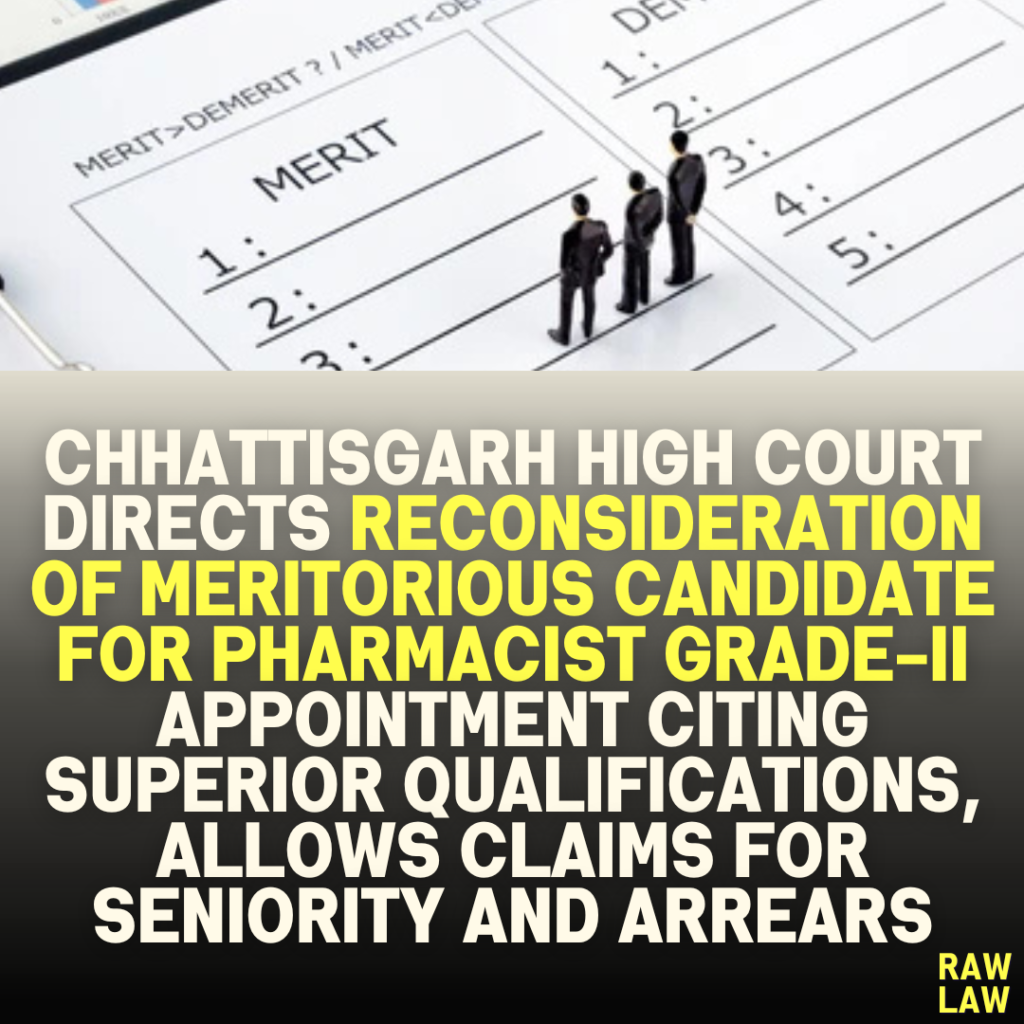Court’s Decision:
The Chhattisgarh High Court directed the state authorities to reconsider the petitioner’s claim for appointment as a Pharmacist Grade-II, emphasizing that the petitioner was more meritorious than the respondents who had been appointed. The court acknowledged that the appointments of respondents were made over 16 years ago, but highlighted the vacant positions and the petitioner’s right to consideration. The petitioner is also given liberty to pursue claims related to seniority and arrears of salary.
Facts:
The petitioner had applied for the position of Pharmacist Grade-II in response to an advertisement issued by the Chief Medical and Health Officer, South Bastar, Dantewada in 2008. Despite securing higher marks than the appointed respondents, the petitioner’s application was not considered. The petitioner had 67.11% in his higher secondary exam and 57.40% in the diploma in pharmacy, while respondents had lower qualifications but were still selected.
The petitioner sought the court’s intervention to cancel the appointments of respondents, alleging that they were less meritorious and had wrongfully been appointed. Respondents’ appointments had been previously cancelled following a complaint by the petitioner, but their cancellation was overturned in a separate legal proceeding, allowing them to continue in their positions.
Issues:
The primary issue was whether the state authorities’ decision to appoint respondents, despite their lower merit, was justified and whether the petitioner, being more qualified, should have been appointed in their place.
Petitioner’s Arguments:
The petitioner argued that he was more meritorious than the respondents based on his academic scores and claimed that the state authorities had acted arbitrarily by not considering his application. He sought the cancellation of the respondents’ appointments and his own appointment to the position.
Respondent’s Arguments:
The respondents argued that they had been appointed lawfully in 2008, and it would be inappropriate to cancel their appointments after such a long time. They maintained that there had been no misrepresentation on their part, and the appointments were made after proper scrutiny.
Analysis of the Law:
The court examined the merit of the petitioner in comparison to the respondents. The petitioner had scored higher in both the higher secondary examination and the diploma in pharmacy, making him more qualified than the respondents. Despite this, the state authorities did not provide any specific reason for not considering the petitioner for the post, which was critical to the court’s decision.
Precedent Analysis:
The court referenced no specific precedents but relied on principles of fairness and merit in public appointments.
Court’s Reasoning:
The court reasoned that given the petitioner’s superior academic qualifications and the absence of any clear justification from the state authorities for his exclusion, he deserved reconsideration for the appointment. Furthermore, the court noted that since vacant posts still existed, the petitioner’s appointment could be made without disturbing the existing appointments of the respondents.
Conclusion:
The petition was disposed of with a direction to the state authorities to consider the petitioner’s claim for appointment as Pharmacist Grade-II, with the petitioner given the liberty to pursue claims related to seniority and arrears of salary.
Implications:
This decision underscores the importance of merit in public appointments and sets a standard for fair consideration in recruitment processes. The case also highlights the need for transparent and justified decision-making by state authorities in appointment matters.



